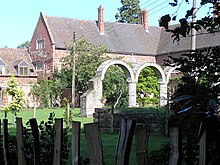The siege of High Ercall Hall in High Ercall, Shropshire, England took place during the First English Civil War. There were a total of three sieges. In each of the sieges, the Hall was held by the Royalists and besieged by the Parliamentarians. The final and longest siege took place from July 1645 to March 1646, when the Royalist commander surrendered the hall to the Parliamentarians.
| Siege of High Ercall Hall | |||||||
|---|---|---|---|---|---|---|---|
| Part of The First English Civil War | |||||||
 Ercall Hall | |||||||
| |||||||
| Belligerents | |||||||
|
|
| ||||||
| Commanders and leaders | |||||||
|
Lord Newport Sir Vincent Corbet | |||||||
| Strength | |||||||
| 200 | |||||||
Shropshire | |||||||
History of the building
editHigh Ercall Hall, in the village of High Ercall, was a fortified 13th-century manor built by the Arkle family.[citation needed] In the seventeenth century the estate was owned by the Newport family and a new mansion had been built in 1608 for Sir Francis Newport alongside the older house.[1][2]
Siege
editThe Newports were prominent royalists and during the civil war, Richard, Lord Newport garrisoned the Hall for the King with 200 troops.[3][4][5] A large earthen bank was raised over the north and north-west curtain walls to provide a defence against cannon and musket fire.[citation needed]
Between 1645 and 1646 the house was besieged three times by Parliamentary forces.[5] The first siege caused damage to the nearby church and resulted in the loss of the drawbridge, but ended with a Parliamentarian withdrawal.[citation needed]
The second siege ended when the now reinforced garrison again beat off the Parliamentarian attack.[citation needed]
The third siege however, which started in July 1645, proved to be decisive. The Parliamentary forces were now in a position to effect an artillery bombardment of the buildings and, in spite Lord Newport arriving with more reinforcements,[citation needed] the Royalist commander, Sir Vincent Corbet, surrendered on 28 March 1646.[5] Under the terms of surrender the 212 surviving members of the garrison, were allowed to leave for the Royalist city of Worcester. Forty members of the cavalry were allowed to keep their arms, but the rest of the garrison had to leave their arms behind along with all the other materiel "of which there was a great plenty".[4]
The new building erected in 1608 was severely damaged in the shelling. Only a fragment of the loggia remains as a short row of arches in the garden of the older house.[citation needed] With the loss of High Ercall, Ludlow was the only garrison in Shropshire left in the control of the Royalists, and it fell in May of that year.[4]
See also
editCitations
edit- ^ British Museum 1867, p. 44.
- ^ English Heritage staff 1952, Ercall Hall (List entry Number: 1187259).
- ^ Ridgway 2009, Ercall at War.
- ^ a b c British Museum 1867, p. 46.
- ^ a b c Manganiello 2004, p. 253.
References
edit- British Museum (1867), "High Ercall", The Garrisons of Shropshire During the Civil War, 1642–48, Shrewsbury: Leake and Evans
- English Heritage staff (4 January 1952), Ercall Hall (List entry Number: 1187259), The National Heritage List for England, English Heritage. Endnotes:
- Country Life, 21 February 1920
- Manganiello, Stephen C. (2004), The Concise Encyclopedia of the Revolutions and Wars of England, Scotland, and Ireland, 1639–1660 (Illustrated ed.), Scarecrow Press, ISBN 9780810851009
- Ridgway, Rob (18 July 2009), "A brief journey through time)", Ercall at War, retrieved 10 November 2012.[unreliable source]
Further reading
edit- Domesday Reloaded, D-block GB-356000-315000, Civil War High Ercall, BBC, 1986
- English Heritage staff (2007), Pastscape: Ercall Hall (id: 70291), National Monuments Record, English Heritage Notes:
- Transactions of the Shropshire Archaeological and Historical Society, 4, vol. 7, 1918–1919, pp. 139 ff (includes illustrations)
- The Castles and Old Mansions of Shropshire, 1868, p. 48 (illustration)
- Field Investigators Comments F1 ASP, 11 August 1965
- List of Buildings of Special Architectural or Historic Interest, DOE(HHR) District of the Wrekin Salop, April 1983, pp. 82–83
- Medieval Village Research Group annual report, MVRG Report 7, 1980, pp. 51–58
- Transactions of the Shropshire Archaeological and Historical Society, vol. 62, MC Hill, 1979–1980
- Time Team (24 February 2002), High Ercall, Shropshire, Time Team: Season 9, Episode 8, www.tv.com
- Time Team (16 May 2012), High Ercall, Shropshire, Channel 4
- Whatley, Peter (22 July 2012), High Ercall Hall, Philip Davis Contains a bibliography.
